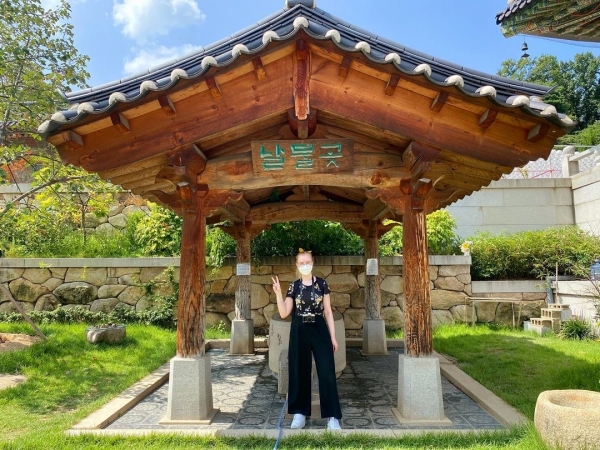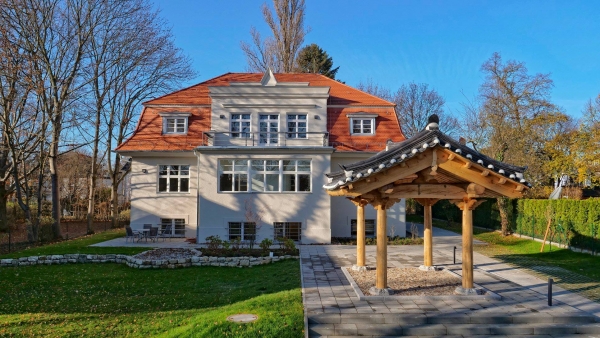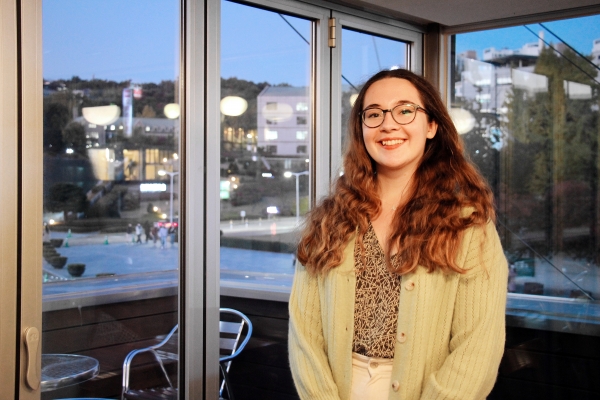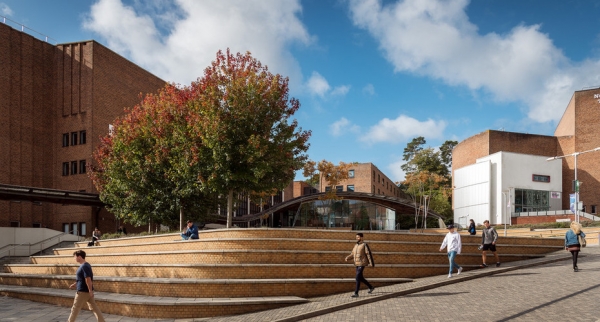International exchange programs allow students from two universities in two different countries to spend a semester or two in each other’s institutions taking courses. In this edition, two students each from Germany and England introduced their home universities for Ewha students looking into the right universities for an exchange.
Cornerstones of Free University of Berlin: Truth, justice, and freedom
Henrike Georgina Rottstock, a junior majoring in Korean Studies at the Free University of Berlin (FU), came to Korea three months ago. She plans to continue her exchange until mid-August next year, completing a one-year exchange.
Rottstock explained that FU was founded in 1948 by professors and students who fled from the Soviet ideology restricting education. When the Soviets divided Berlin into east and west, professors and students who did not sit well with the Soviets went to the west and founded what is now FU in the south-western part of Berlin.
The school was founded on three values: truth, justice, and freedom, as seen in the school emblem. Rottstock emphasized that the name “Free” refers to freedom of thought, without fear of being censored by any ideologies or governments.
Before choosing to major in Korean Studies, Rottstock graduated with a Bachelor’s degree in physics from Ludwigs-Maximilians-University of Munich (LMU). Since 90 percent of the students were men, she had to fight every day to win her own place in the middle of the male-dominated faculty.
While majoring physics at LMU, Rottstock learned Korean and Japanese since physics research conducted in South Korea and Japan is considered to be advanced. She then discovered her interest in Korean politics. Growing up under a politically active mother, the division of North and South Korea as well as the ensuing conflicts in the Korean peninsula caught her attention.
“I was aware of the history that my mother experienced and grew up with the values of freedom and fighting for democracy,” she said. “I wanted to study more about the Korean language, culture, politics, and economics, which is why I applied for the East Asian program at FU.”
Rottstock regards this as the best decision she has made in her life. Even though the faculty of Korean Studies is small, with only 20 to 50 students, the professors are passionate, and the students are also eager to help each other. Back when she studied physics at LMU, the competition among students to receive the best grades was fierce. However, at FU, students study together, instead of working against each other. Even when all the classes were conducted online due to the pandemic, the students created a group chat where they would meet every day and exchange their assignments on Google Docs.

As for her favorite places in FU, Rottstock pointed out the old wood building with cherry blossom trees and the traditional Korean pavilion in front of the Korean Studies building. According to Rottstock, in 2018, Lee Gwang- bok, a master builder of traditional Korean houses, gifted the architecture to the faculty, where it soon became their pride.
“At a summer school I attended in August this year in Korea, I went to Bongeunsa Temple and found the same structure like the one we have in front of our building,” she said. “There are other Korean Studies programs in Germany, but the one in FU tries to not only teach us about Korea, but also brings a little bit of Korea to us in Berlin, which makes it more special.”

What Rottstock loves about FU comes down to the founding principles: truth, justice, and freedom. The professors encourage students to speak up for themselves, and the students are also politically active as there are many political and cultural campaigns.
One example is an act called Wednesday Demonstration, which her faculty took part in. When the Japanese embassy tried to take down the Comfort Women statue in front of the Japanese embassy in Berlin, her fellow students rallied with the Korean NGO to protest, and as a result, preserved the statue.
She addressed the importance of Ewha based on what she experienced on campus. One of the issues women in Korea face is that they have a hard time getting jobs after receiving higher education.
“A professor in one of the courses I take said that Ewha is very important because it gives an education focusing on women, and provides students the chance to become leaders,” she said. “Unlike the education centered on men being the next leader, Ewha teaches women that you can be a leader as well.”
University of Exeter: Grasping both academic pursuits and fun
Cleo Drusilla Eve Gravett, who is majoring in English literature at the University of Exeter (Exeter), is spending her third year of college as an exchange student at Ewha. For many Ewha students interested in universities open for exchange programs, Gravett shared information about her home university back in the United Kingdom.
According to Gravett, Exeter is a great place for students who are interested in writing and reading literature. They have produced many distinguished writers including the Harry Potter series author J.K. Rowling and two-time Oscar-winning screenplay writer Robert Bolt. As an English literature student, this was an appealing feature for her when committing to Exeter.

She mentioned that many writers and poets took inspiration from the natural environment in and around Exeter. In fact, the buildings and settings from the Harry Potter series were actually inspired by real places in the city of Exeter. In her opinion, Exeter allows a more relaxing atmosphere when contrasted with the busy and hectic environments of cities like Seoul or London.
“Our university is located in a county called Devon, and the nature is very beautiful there,” she said. “Just a 20 minute train ride will take you to the sea and a 45 minute drive to the moors with wild horses and sheep.”
One of her favorite spots on campus is the Old Library where the Bill Douglas Cinema Museum is located. The Cinema Museum exhibits a huge collection of historical and noteworthy materials related to cinema. The library also preserves and publicly displays the original manuscripts of many significant literary works, playing a major role in the understanding of early periods of English literature. Gravett was personally impressed by the original manuscript of “Lord of the Flies,” the debut novel of Nobel Prize-winning author William Golding.
Gravett also emphasized that Exeter is one of the universities that have Model United Nations (MUN), an organization where students play a delegate role of different countries simulating the United Nation.

“The MUN at Exeter is very strong and multicultural,” she said. “I think it would be helpful to any student, including international and exchange students, because it allows them to discuss global issues at various viewpoints and at the same time boost their debating skills.”
Adding to these academic distinctions, Gravett introduced other unique aspects of her university.
She explained that Exeter is a very sporty university with an especially notable rugby culture. Despite the university’s small size, their rugby team has been highly successful, winning the nationals several times. The pandemic has kept sporting events from being held the past two years, but now that the university is opening up again, she expects these events to garner great popularity.
“If you like sports, Exeter is definitely a good place to go,” she said. “Anyone interested in playing a certain sport can get a chance to train and play on a team regardless of their level of performance.”
She also mentioned how there are such a variety of clubs at Exeter, from baking to gin clubs, dance clubs and even a quidditch club called the Harry Potter and Quidditch Society. Students at Exeter have countless opportunities to participate in academic performances, and at the same time have access to activities that they are interested in.
Another society Gravett recommended for exchange students was Exeter’s West Country Society, where the members organize trips around the West Country, the south-western area of England. The area includes the counties of Devon, which is where Exeter is located, Cornwall and Somerset, so the society helps students who are new to the area get to know the traditions and places of the West Country.
“I have gone on a few trips with the West Country Society during my first year,” she explained. “One of the places I visited was Totnes, which I remember was very quaint with cobble streets—it almost felt like a place in Harry Potter.”

